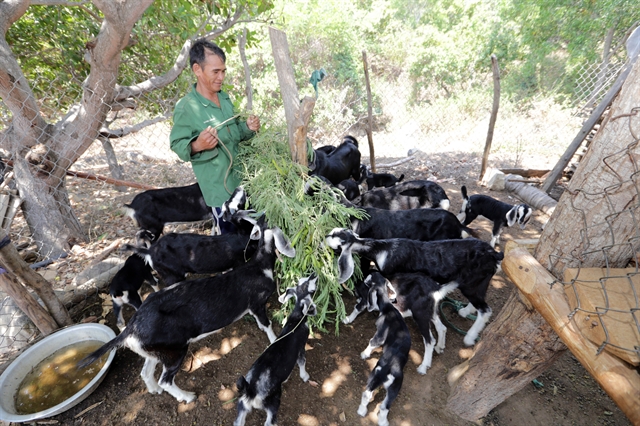 Society
Society

Nearly eight million poor households and families subject to special social policies have received soft loans worth nearly VNĐ222 trillion (US$9.56 billion) over the past three years, contributing to improve the living conditions of the poor, particularly in ethnic minority-inhabited and rural areas.

|
| A farmer from Raglai ethnic minority group in central Khánh Hoà Province's Cam Ranh City got a low interest rate loan to develop crops and raise goats. — VNA/VNS Photo Trần Việt |
HÀ NỘI — Nearly eight million poor households and families subject to special social policies have received soft loans worth nearly VNĐ222 trillion (US$9.56 billion) over the past three years, contributing to improve the living conditions of the poor, particularly in ethnic minority-inhabited and rural areas.
The credits, granted to the households from 2016 to August 31, 2019, have helped over 1.4 million households escape poverty, director general of the Việt Nam Bank for Social Policy Dương Quyết Thắng said at an online conference held on Monday to review the role and efficiency of credit policies in sustainable poverty reduction.
The loans helped create jobs for 775,000 labourers and funded the construction of 4.9 million rural clean water and environmental treatment facilities and more than 108,000 houses for the poor.
Nearly 200,000 poor students could continue studying thanks to the loans.
Vice Chairman of the Việt Nam Farmers’ Association Nguyễn Xuân Định said credit programmes aimed at disadvantaged people showed breakthroughs in the leadership and direction of the Party and State in hunger elimination and poverty reduction efforts.
Offering credits with low interest rates for the poor helped to encourage them to find ways to work or do business to escape poverty themselves, he said.
Nguyễn Thị Quyến, a farmer from central Bình Định Province’s Hoài Sơn Commune, said the loans helped her two children continue their educations and they both had stable jobs now.
Vice Chairman of the People’s Committee of the Central Highlands province of Lâm Đồng, Nguyễn Văn Yên, said the credit policy was considered one of the key pillars in promoting economic development, particularly in changing production methods for poor households.
The policy has helped nearly 11,000 households in the province escape poverty over the past five years and contributed to reduce the province’s poverty rate to 2.85 per cent in 2018 from 6.67 per cent.
Acknowledging the efficiency of the programme in implementing the national target of sustainable poverty reduction, Deputy Prime Minister Vương Đình Huệ said the Bank for Social Policy and the credit policy was one important pillar of the national target programme on sustainable poverty reduction.
This pillar helped reduce the number of poor households, prevent “black credit”, creating resources for localities to implement the national target programme on sustainable poverty reduction and new-style rural area construction, and helping to improve the spiritual and material life of people, he said.
The policy has been widely applied, meeting the demand for credit by poor people, and helped to promote the proactiveness and responsibilities of poor people in poverty reduction, he said.
However, he added that measures were needed to improve the efficiency of the social credit policy and the operation of the Bank for Social Policy.
It was also necessary to increase inspections and supervision to effectively use and manage the fund, he said.
He urged localities to increase leadership and guidance over social policy credit activities, considering it their regular and key tasks.
They were also instructed to connect the policy with agricultural and rural development, education, vocational training, ensuring social security and sustainable poverty reduction.
The deputy PM suggested increasing the annual credit growth rate of the bank for social policy to reach 10-12 per cent. — VNS




